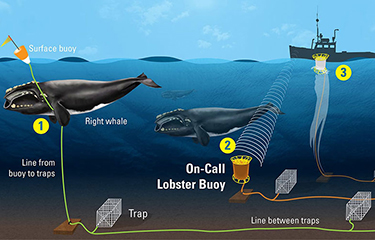Even with congressionally-approved six-year reprieve from economically restrictive rules related to preserving the remaining population of critically endangered North Atlantic right whales, the lobster fishery in the U.S. Northeast is facing an inflection point.
The Maine Lobstermen’s Association is continuing to battle the National Marine Fisheries Service in court, challenging the agency’s May 2022 biological opinion for right whales.
The start of 2023 also marked a change in how lobstermen in Maine must handle catch reporting. As of 1 January, commercial lobstermen in Maine – who were responsible for 80 percent of the U.S.’s lobster catch in 2021 – must now report all harvest electronically.
In its most-recent meeting, the Atlantic States Marine Fisheries Commission announced it’s considering increasing the minimum size of lobsters allowed to be caught in coastal waters and a decrease in the maximum size of lobsters caught offshore.
Some regional lobstermen can also expect money in the mail from ASMFC, to partially offset the expense of gear modifications required by 2021 North Atlantic right whale protections.
Separately, 30 federally permitted commercial lobster vessels in Massachusetts and Rhode Island are currently collaborating with the Northeast Fisheries Science Center Gear Research Team to test on-demand (also called ropeless) fishing gear in federal waters otherwise closed to fishing with static vertical lines, NOAA announced 7 February.
The group is also studying a pilot project implementing the EdgeTech Trap Tracker app, which allows anyone within five nautical miles of set lobster gear to see it on an electronic map.
Regional lobster are also coping with the recent decision by the Gulf of Maine lobster fishery to temporarily withdraw from its effort to pursue Marine Stewardship Council recertification.
Maine Certified Sustainable Lobster Association President Craig Rief and MCSLA General Counsel John Whiteside did not respond to requests from SeafoodSource for comment. But Luke’s Lobster Co-Founder and Chief Innovation Officer Ben Conniff said he’s confident the fishery can be recertified following ...
Image courtesy of Conservation Law Foundation








